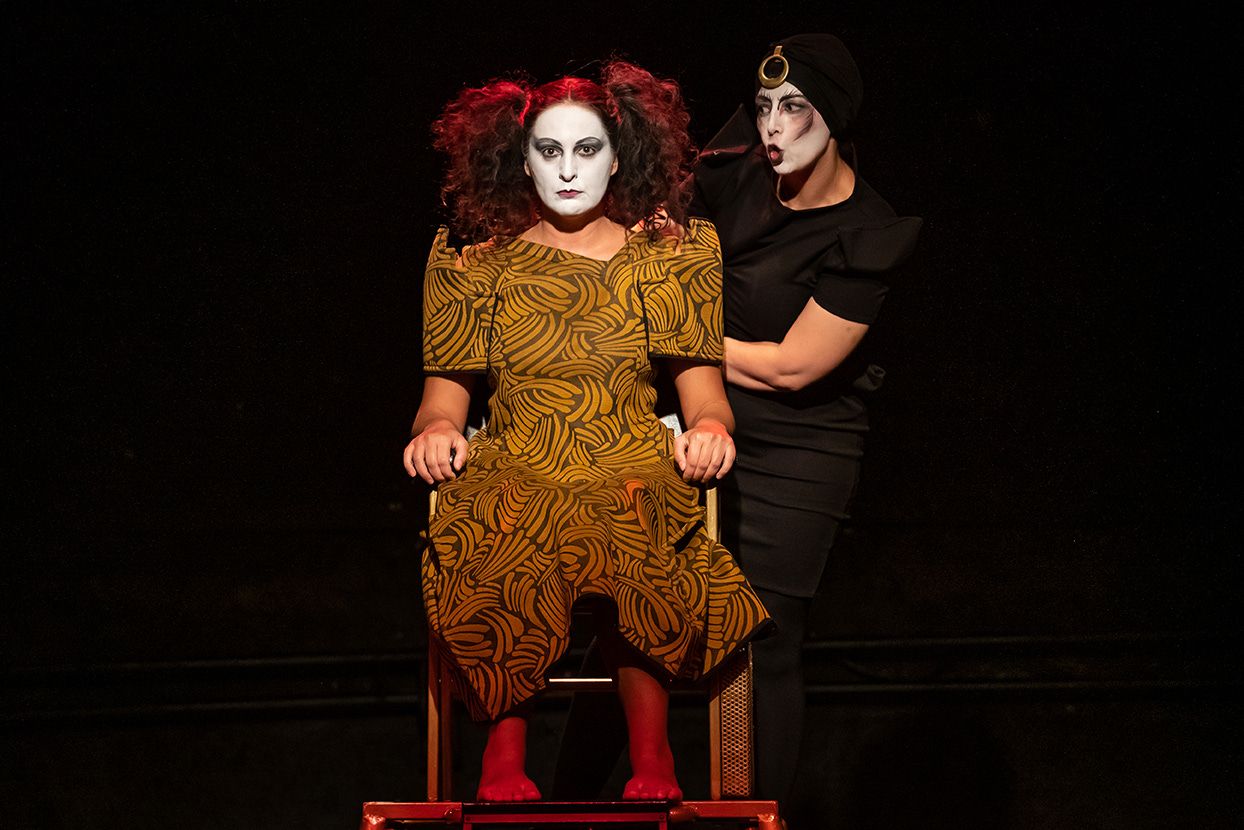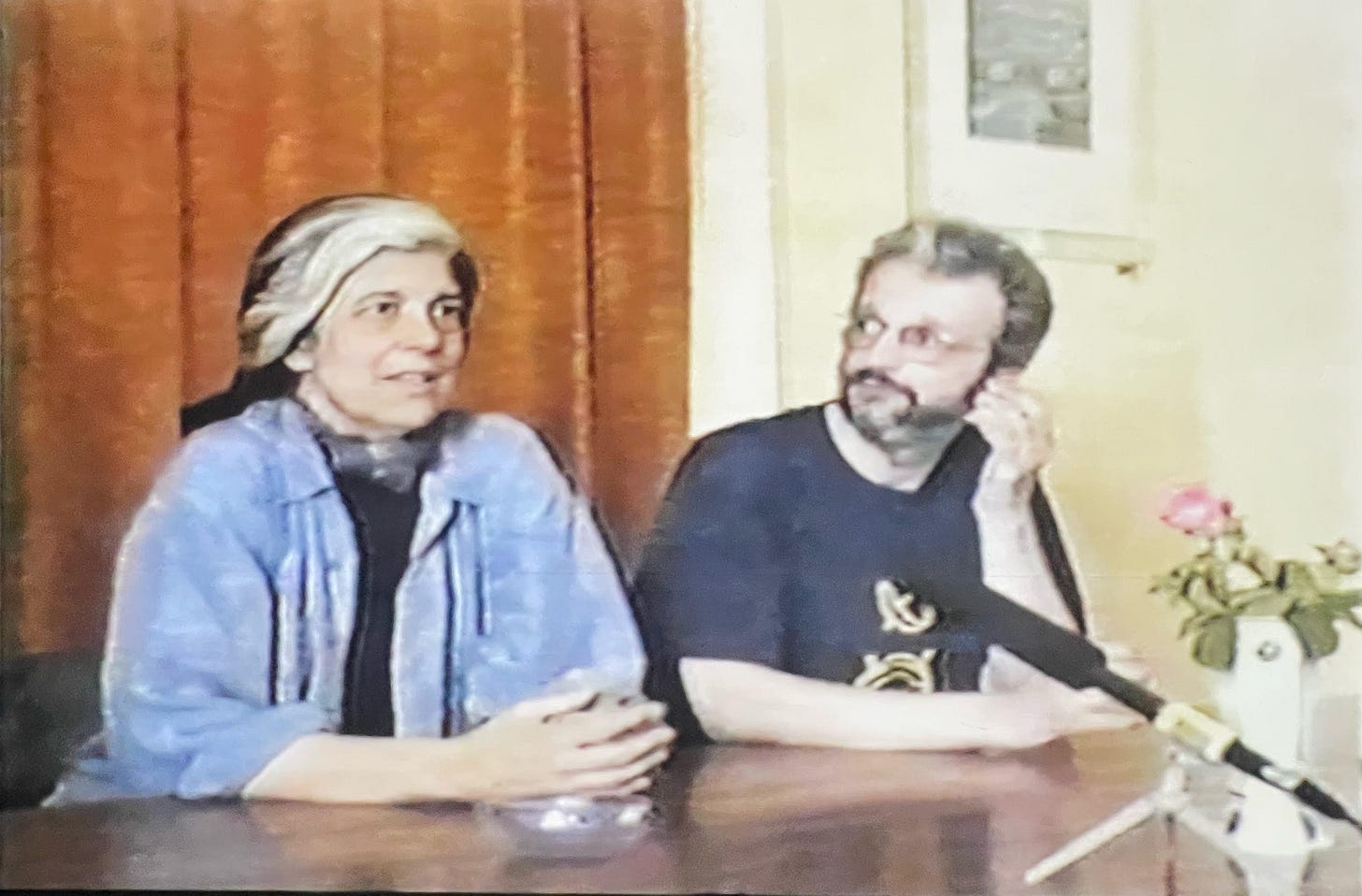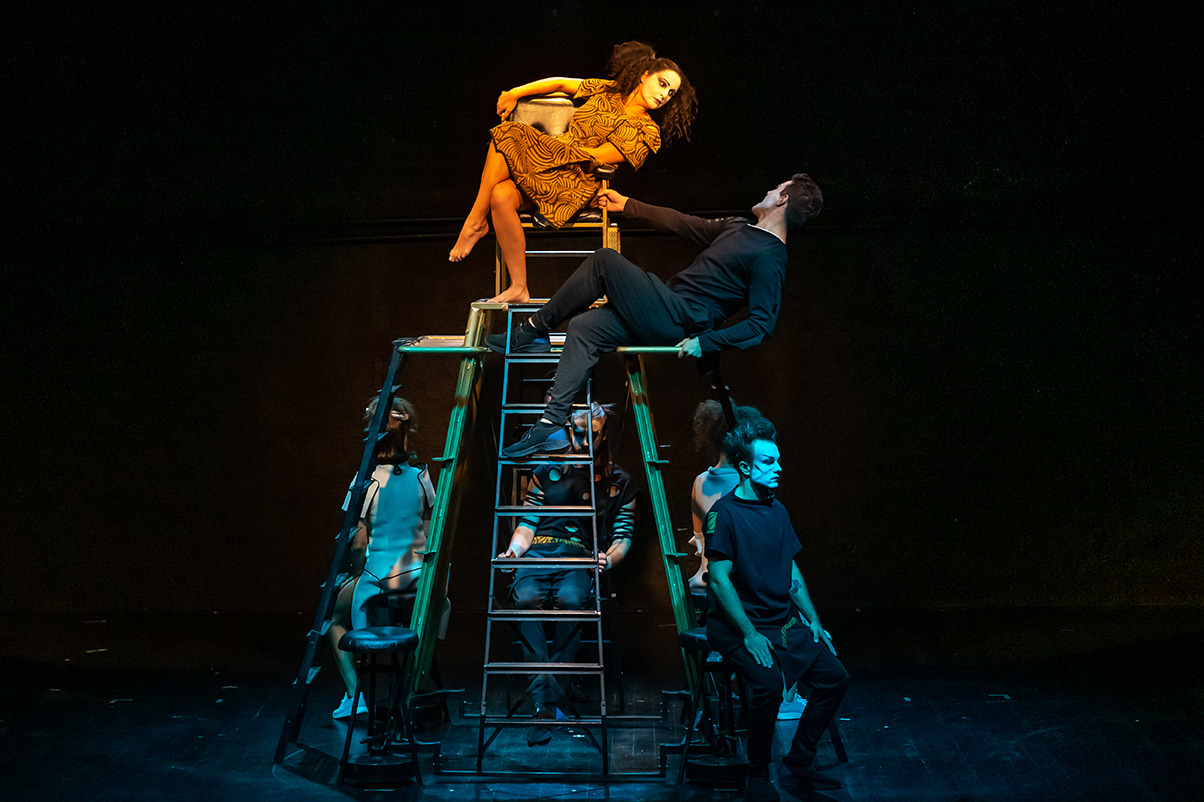Sontag in Sarajevo: MESS Festival and Alice in Bed
Sarajevo celebrates 30 years since Susan Sontag's legendary production of Waiting for Godot.
Welcome to Café Europa, a new-ish weekly newsletter dedicated to European theatre. Here, you can expect a mix of in-depth reviews and profiles of the artists and companies that excite me, plus festival coverage and other stuff.
There are nearly 200 subscribers now, which is exceedingly pleasing. Thank you to my new paid subscribers, it really makes a difference and will allow me to expand my coverage. Predictably I also have a Ko-fi account. I want to keep as much of the content free as possible, so all donations are very welcome. If you find this newsletter valuable and think others would too, please do spread the word!
In 1993, in the midst of the brutal breakup of Yugoslavia, Susan Sontag came to the besieged city of Sarajevo as part of a trip arranged by writers’ organisation International PEN. Moved by what she saw, she decided to return later in the year, not merely as an observer, as a passive witness, but to do something tangible, to create something.
When Haris Pašović, then director of Sarajevo’s MESS festival invited her to direct a play, she accepted. Her original idea was to stage Beckett's Happy Days, but once there, it became clear that Waiting for Godot was a far better fit for a city waiting for an intervention that would never come.
The production, which took place at Sarajevo Youth Theatre in August that year, has become legendary. Thirty years on, this year’s MESS festival honoured Sontag's connection to the city with a new production of her play Alice in Bed, directed by Hungarian director Zoltan Balázs and co-produced by Maladype Theatre and the Sarajevo War Theatre, itself founded during the siege of Sarajevo.
Founded in 1960, MESS, is the longest-established theatre festival in the Balkans. Originally called the Festival of Small and Experimental Stages of Yugoslavia, (or Festival malih i eksperimentalnih scena Jugoslavije – hence the name MESS), the festival was initially halted by the outbreak of war, until Pašović decided not just to continue it, but to also launch the Sarajevo Film Festival at the same time. Though shells were raining on the city, utilities were cut off and food was scarce, the appetite for art remained undimmed. Even though people were taking their lives in their hands every time they ventured outside, they were undeterred. The audiences showed up. This excellent TLS essay by Amber Massie-Blomfield on Sontag’s Godot captures this need, how during a period of such hardship, people sought solace and release in art.
Don't Cry for Me, Sarajevo, a 2018 documentary by current MESS director Nihad Kreševljaković, offers reflections on the production from the cast and creative team. Sontag and her cast staged only the first act of the play (which displeased the Beckett estate, but it’s fair to say the cast had bigger things to worry about) and featured not one but three pairs of performers in the roles of Vladimir and Estragon. Performances took place in the afternoon, so people did not have to venture out at night and the theatre was lit by candlelight as there was no electricity (they had to keep a close eye on the candles after show as they, like everything else, were in short supply). The actors recollect how the chain-smoking Sontag was prone to stubbing out half-smoked cigarettes until she saw the distracted way her actors were eyeing her ashtray and brought packs to share around. Despite, or rather, because of all this, Izudin Bajrović who played Vladmir, feels that he gave what way have been the best performance of his career, the knowledge that every performance might be his last proving to be incredibly creatively energising. Not everyone was enthusiastic about the production. Some of the international media were sniffy about it and one journalist asked Sontag at the time if she was enjoying her “safari.” But it’s clear, listening to people speak about it years later – and watching archive footage by Pjer Zalica in his film Godot-Sarajevo - that it meant something to those who witness it. It gave people a sense of purpose and normality, it was, says the late actor Sead Bejtovic, a chance to “cleanse their souls.”
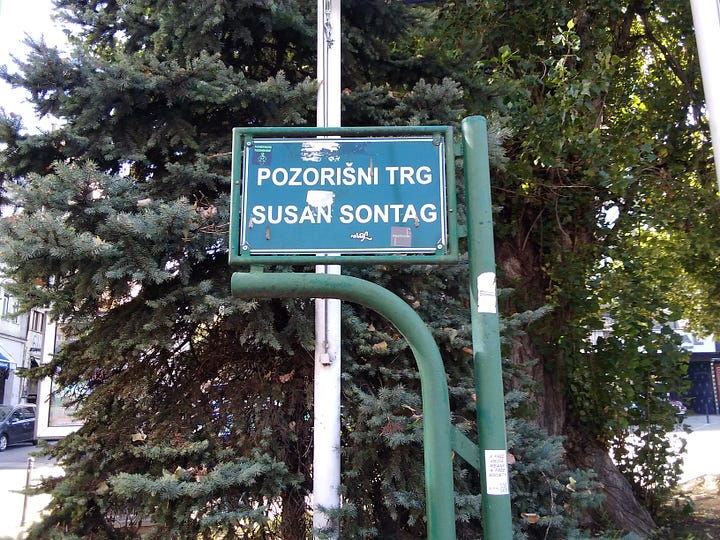
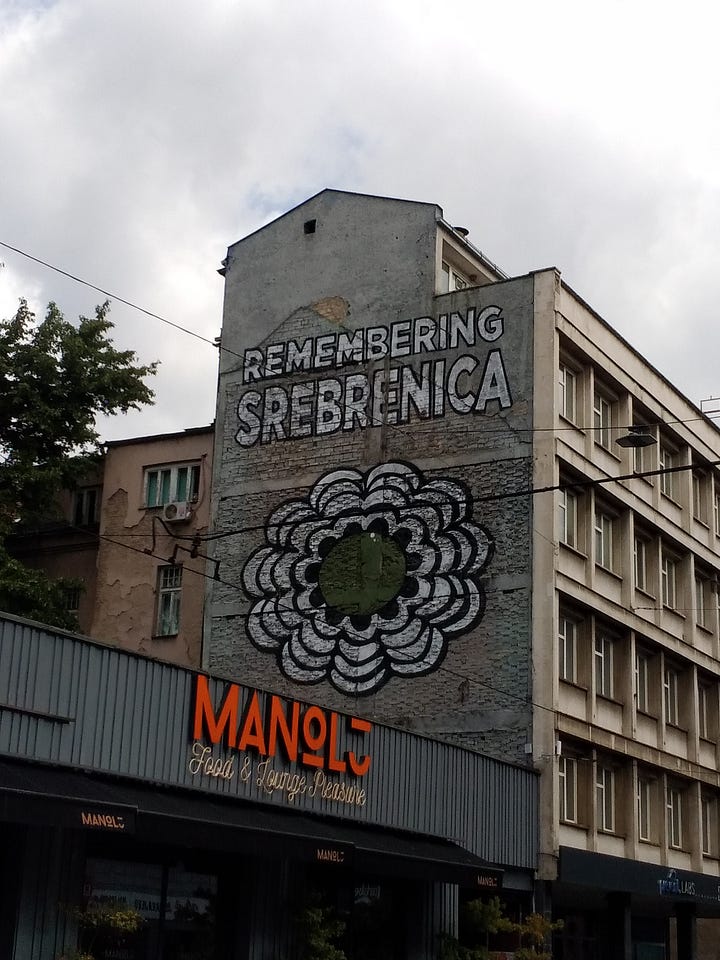
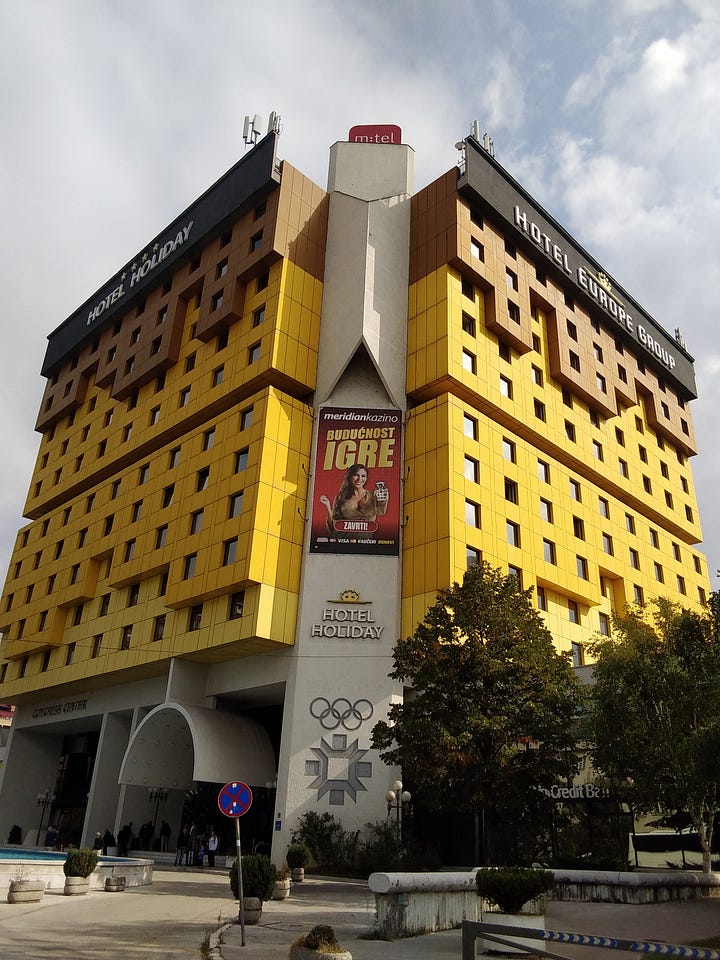
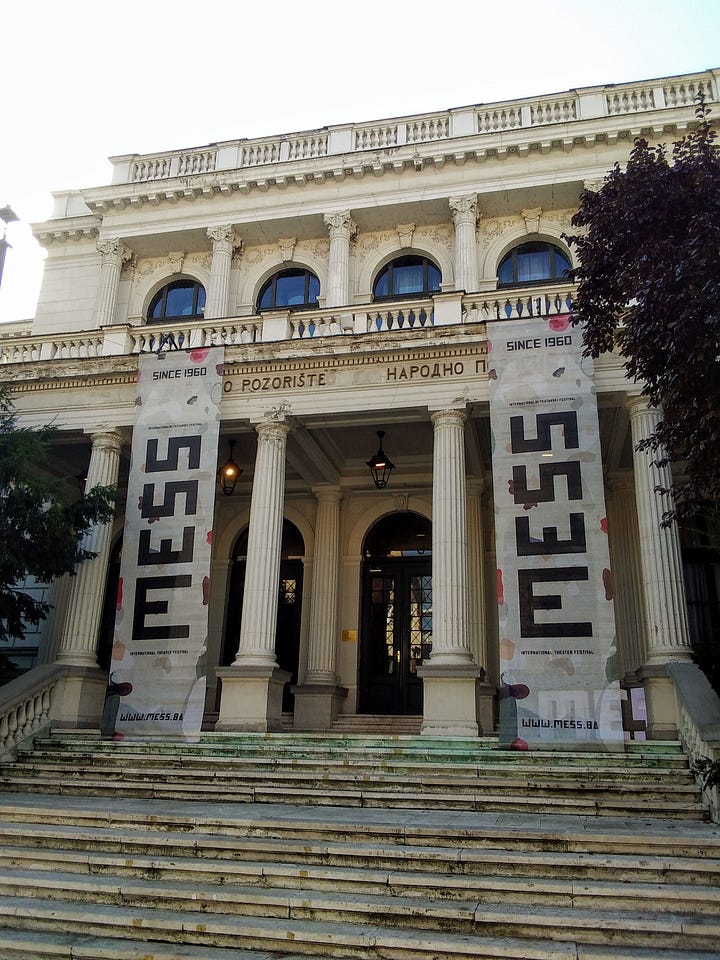
Today the square outside the National Theatre in Sarajevo is named for Sontag, who was made an honorary citizen. During my weekend at MESS, I ended up staying in the same hotel as Sontag, the bright yellow former Holiday Inn located on a stretch of road that came to be known as Snipers’ Alley – I’d read this before but never fully appreciated the reason why until I looked along the wide-open street to the mountains beyond. Sontag took breakfast rolls from the hotel to feed her cast, but, more than that, she brought the attention of the press to a city that felt as if it had been forgotten, and to its people, an opportunity to hold on to the very human need to create, to make something while so much was being destroyed. It is in this spirit, this year’s MESS festival opened on 30th September with Caligula by the National Academy Drama Theatre Ivan Franko from Ukraine, directed by Ivan Uryvskyi and featuring a charismatic central performance by Oleksander Rudynskyi.
For more on the reprieve that art brought to the city during the war, I’d recommend this SEEstage interview by Nick Awde with Kreševljaković, about the founding of the Sarajevo War Theatre, and the surprisingly emotive documentary Scream for Me, Sarajevo, which looks back on Bruce Dickinson's 1994 concert in Sarajevo and how much it meant both to the audience at the time, to Dickinson and his bandmates.
Alice in Bed: A life of the mind
Susan Sontag’s Alice in Bed isn’t performed all that often, though Ivo van Hove had a crack at it in 2000 at New York Theatre Workshop. The play is inspired by the life of Alice James, the sister of novelist Henry and psychologist William, a prolific, eloquent diarist who spent much of her life as an invalid, beset by various ailments including “stomachic gout” and “squalid indigestions,” and confined to her bed. She would suffer a mental collapse and contemplate suicide, and seemed almost relieved when diagnosed with the breast cancer that would kill her at 43, as if she had been waiting for its arrival. It's easy to imagine what might have drawn Sontag to this story of a brilliant woman dealing with a uncooperative body, given her own history with cancer.
Sontag laces Alice's story with imagery from Alice in Wonderland. It’s this fantastical aspect that Balázs draws upon in his production. The play’s main challenge is present in its title. Its protagonist is bed-bound. Van Hove strapped his lead performer to a contraption. Balázs dispenses with the bed altogether and places Alice on a chair on top of a metal frame accessible only by ladders. There's more than a dash of the Red Queen to Alice to Snežana Bogićević’s white-faced, haughty Alice dominating the stage from her throne. The actors playing Henry and the James siblings’ oppressive father, who is forever pitting his children’s intellects against one another, clamber over the frame. They are forever stroking and prodding her, and she is obliged to slap their hands away.
The text is interspersed with Wonderland-inspired pop songs including Avril Lavigne’s Alice and Kerli’s Tea Party, which the cast either lip-sync along with or, in the case of Smokie’s Living Next Door to Alice, perform in a choral form (several times). Still perched on her chair, Alice twists and gyrates to the music - Bogićević’s performance of this choreography, while suspended above the stage, is never less than impressive.
A designer as well as a director, Balázs’ productions tend to be visually striking. His production of Polish writer Elzbieta Chowaniec’s Gardenia, a play about the complexity of mother daughter relationships and the way disappointment and frustration can be handed down from generation to generation, took place on a yellow and black, Mondrian painting of a set with a spinning black metal structure on one side - he clearly likes sculptural elements. Here the stage is bare, except for Alice’s pedestal and the performance takes place entirely on top of it, or within it, with the actors dangling from ladders or hanging upside down like bats. This has the effect of centring Alice, with the other performers less characters than different reflections of her – she keeps a mirror beside her chair into which she occasionally stares.
The play is at its most dream-like during Sontag’s take on Lewis Carroll’s tea party scene, in which the Mad Hatter and Dormouse are replaced by poet Emily Dickinson and American journalist and women’s rights campaigner Margaret Fuller, both independently minded women possessed of great imaginative power. Matek Mavra and Hana Zrno play these two in costumes midway between a Pierrot and a human playing card, straddling the back of Alice’s chair, clambering around her like monkeys. Sontag's play is already relatively opaque and at times I felt the concept at times added to this impenetrability. Had I not read up on it beforehand, I would not have grasped that characters from Giselle and Parsifal were also present at the tea party fantasia, as Balázs had distilled them into two performers, though this does account for the brief bursts of opera.
While Bogićević’s vigorous physicality conveys Alice’s lively mind, her questing intellect, it also sometime works against this sense of containment and physical limitation. In this poppy, intensely physical climbing-frame staging you sometimes miss the sense of contrast, between stillness and limitation and the terrain of the imagination.
Towards the end of the play, Alice boards a ship to Liverpool, though is once again obliged to spend the trip confined to her room. In London, staying with Henry, a young Cockney thief challenges her to rise from her bed. What feels like the play’s key passage however happens earlier though, a soaring monologue on the power of the imagination, how even while physically confined to her bed, her imagination allows her to travel. Alice describes in rich detail a Rome of the mind, a city through which she as a woman can wander safely and freely, unharassed by men (a still relatable desire). “I can be alone there, quite invulnerable, altogether safe – in my mind, in Rome.” Imaginative travelling grants her an agency otherwise unavailable to her.
Near the end of her life, Alice James said: “Notwithstanding the poverty of my outside experience, I have always had a significance for myself.” Balázs’ production places her on a throne, at once above and apart from the world.
This week in theatre
BITEF – Belgrade International Theatre Festival, the first under the artistic directorship of Nikita Milivojević, runs from 3rd-10th October and the programme includes Frank Castorf’s five-and-a-half-hour Divine Comedy, the Golden Lion-winning beach opera Sun and Sea, and Goodbye, Lindita directed by Mario Banushi (“an exciting new talent,” according to Michael Billington).
The Vegetarian – Sweden’s National Theatre, Dramaten, kicked off its autumn season in September with a new adaptation of Han Kang’s popular novel about the consequences of about a woman’s decision to cease eating meat, directed by Beata Gårdeler.
In Man Everything Must Be Glorious – Munich Kammerspiele’s autumn season gets underway with Jan Bosse’s new adaptation of the novel by Sasha Marianna Salzmann, a migration story which encompasses the former Soviet Union, life in Ukraine, and exile in present day Germany.


